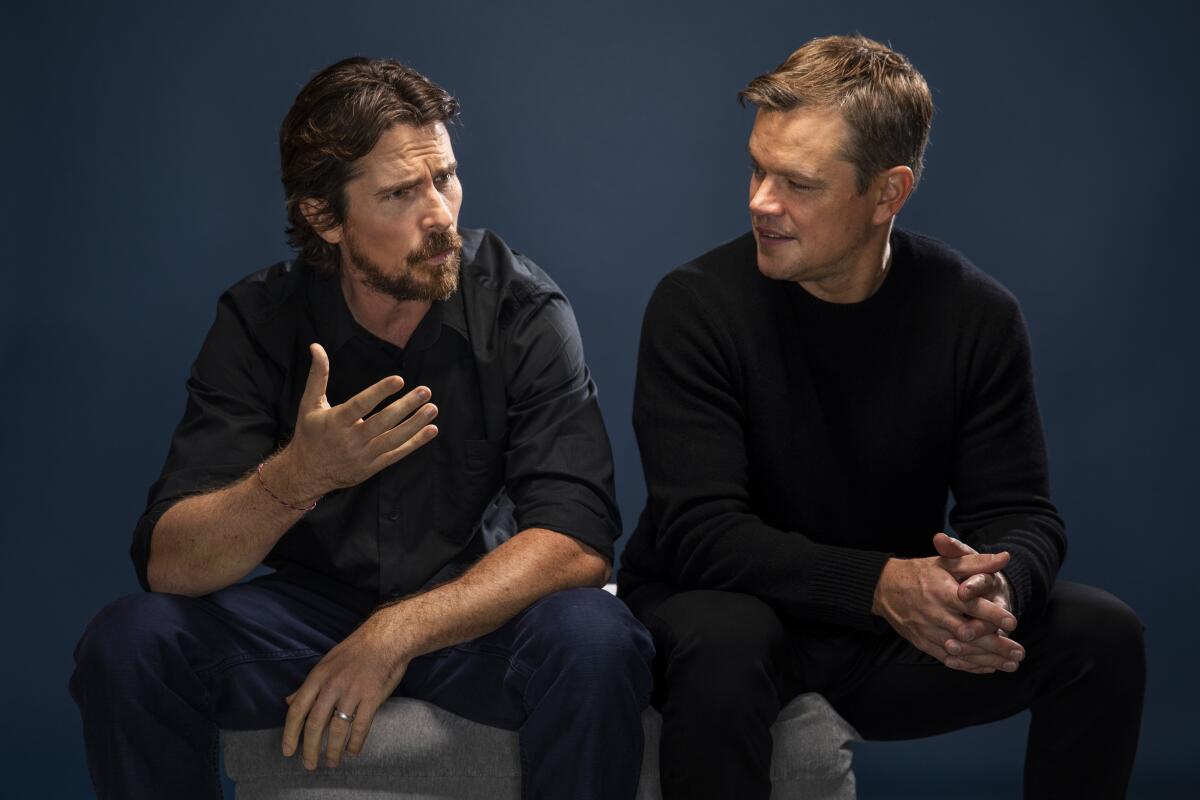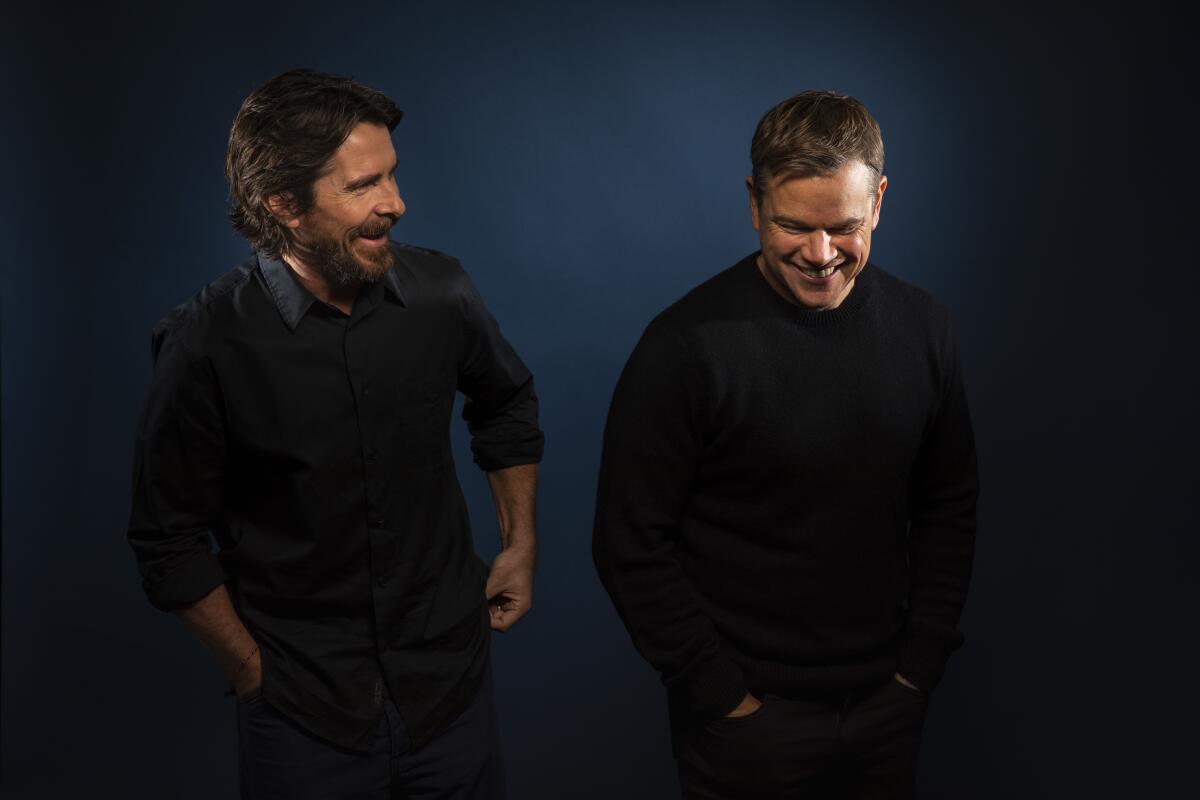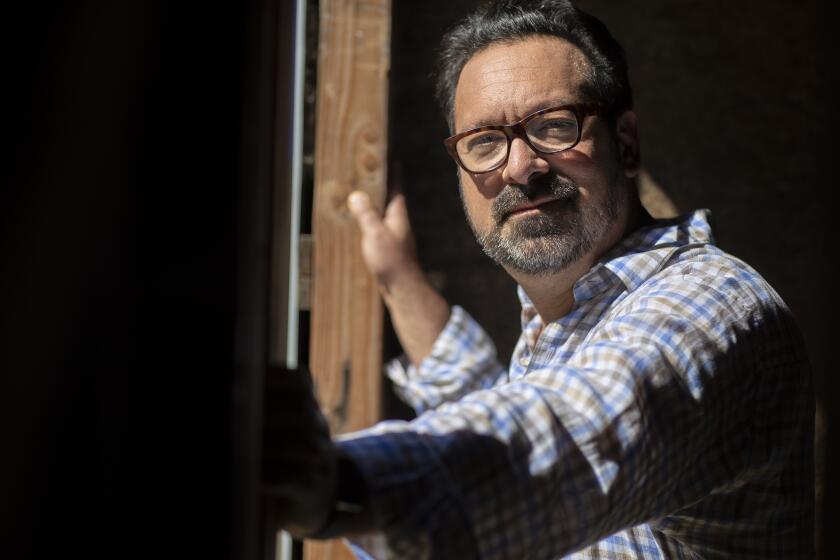Matt Damon and Christian Bale on why you don’t need to love cars to love ‘Ford v Ferrari’

- Share via
Both Matt Damon and Christian Bale have driven at death-defying speeds onscreen a time or two — Damon, most notably, as superspy Jason Bourne, and Bale, of course, behind the wheel of the Batmobile. But in their personal lives, neither would describe himself as as car nut.
Indeed, when director James Mangold first approached them about starring in the new high-octane period drama “Ford v Ferrari” — which chronicles how the staid Ford Motor Co. attempted to unseat the perennially dominant Ferrari at the 1966 Le Mans auto race — neither actor was aware of the real-life history. But in the story of the sometimes turbulent partnership between pioneering automotive designer Carroll Shelby (Damon) and maverick British driver Ken Miles (Bale), the two saw an exciting opportunity not only to share the screen for the first time but to deliver the sort of big, entertaining movie for grown-ups that used to be a mainstay of Hollywood and is now a rarity.
“I think you don’t have to give a damn about cars at all,” says Bale. “Everybody can relate to the story in terms of the passion they have for something that they want to do with their lives and the hurdles that are standing in their way, whether it be from outside sources or demons in themselves.”
With “Ford v Ferrari” zooming into theaters nationwide this weekend, The Times spoke with Damon, 49, and Bale, 45, about working together, the death of the mid-range adult drama and career roads not taken.
You guys have never been in a movie together before but I’m sure you must have been up for some of the same roles over the years.
Bale: Look, I mean, I have taken a lot of roles he has passed on.
Damon: Not a lot — two that I can think of, including one, [the 2010 drama] “The Fighter,” that he won an Oscar for, which is always proof that the right actor gets the job. I looked at that went, “Man, he’s fantastic in that movie.”
Bale: [wryly] But it hasn’t been the other way around. I’ve never passed on anything that Matt has taken. That’s just not the order that it goes.
Going in, what were each of your expectations of what the other would be like to work with?
Damon: I’d talked to actors who worked with him and also we have our agent, Patrick [Whitesell], in common so I had a really good sense of what he’d be like to work with. When you look at Christian on day one of shooting, as an actor, it’s really inspiring because you’re looking at thousands of hours of preparation. He never talks about it and he never makes a big deal about it, but you can see the meticulous attention to detail in everything he’s doing. You’re looking at a fully built mechanism, and it’s awesome.
Bale: Thank you, sir. On my part, I don’t have many friends and people don’t talk to me, so nobody had really told me what it was like to work with Matt. [laughs] But I’d bloody admired him for years.
In this film, they talk about the injustice that the best drivers don’t always get the best gigs. And I remember before Matt became incredibly well-known, I’d seen him in [the 1992 drama] “School Ties,” and that’s what I was thinking. I was going, “Look at that bloke, whatever-his-name-is — he was bloody good and he’s probably never going to work again in his life. There’s the injustice of it all.” And he made it all work for himself.
Though “Ford v Ferrari” is about auto racing, it could also be seen as an allegory for the movie business, with the suits trying to control the artists who are taking risks and pushing boundaries. Did you see it that way?
Damon: It’s like a one-to-one parallel. We laughed about that even as we made it. [20th Century Fox vice chairman and president of production] Emma Watts would visit the set and she was “the suit” and she was talking about it too. That is exactly the movie business. We want to make these things that are extraordinarily expensive and they’re betting on us, and there’s always that tension. We’re investing our careers and our lives and our time, and they’re investing a boatload of money. The stakes are high for everyone.
Though there’s generally less of a risk of dying making a movie.
Bale: [deadpan] It’s just career suicide.
The release of “Ford v Ferrari” has prompted a lot of talk about how this type of movie has become an endangered species. James Mangold said his agent told him, “You’d better enjoy this one because it’s the last one you’re going to get to make.” Did it feel that way to you guys too?
Bale: Yeah, but I approach every film that way. I know what they mean, that this is a particular kind of film that isn’t getting made, but I look at every single film and go, “All right, this is it. No one’s hiring me after this one.” And I quite like that approach.
James Mangold earns Oscar buzz with car-racing drama “Ford v Ferrari,” starring Matt Damon and Christian Bale, which premiered at Telluride Film Festival.
As the business has changed, has it gotten harder to find projects that really excite you?
Damon: Yeah, that $20-[million]-to-$70-million movie is gone. I mean, you can find it, but it’s the exception. It’s just because there’s no DVD market, so you have to make everything in your theatrical release. I remember during [the 2015 sci-fi film] “The Martian,” I said to [then-Fox chairman] Jim Gianopulos, “What are the real numbers with the DVD market gone?” And he said, “Half. Half of the revenue is gone. The business got chopped in half.” So there’s just no way they’re going to make those movies.
But what did happen is this new market appeared, which is the international market — particularly China. So the big home run for the studios now is the movie with the least amount of cultural confusion, the least amount of language. It’s a superhero movie: a good guy and a bad guy, it’s very clear who’s who, they fight three times and the good guy wins twice.
That’s the template, and it’s working, so that’s what they’re making. And our bread and butter for our whole careers was the movie that’s gone now.
Bale: I will be able to comment more on that once my children start actually letting me watch films again. I don’t get to see much or when I do, I’ve got my son clambering on me, and I see, like, 10 minutes and then have to do something else. I actually think “Avatar” might be the last film that I went out and saw.
Damon: [wincing] Why do you want to bring that up? [Ed. Note: Damon recently revealed that he turned down director James Cameron’s 2009 smash, missing out on a massive payday]
Bale: Oh, sorry about that. I totally forgot. I heard it did quite well. [laughs]
Damon: [quietly] Yep.

So if your bread and butter is disappearing, what do you do? Do you think about moving into TV?
Damon: Look, we got to do this one, and I’m about to go make a movie with [“Spotlight” director] Tom McCarthy, and Christian is about to go work with David O. Russell. There are things that get made. We’ll probably just work less frequently. Maybe there will be something on TV. I’m not averse to the idea of doing a limited series. It’s just basically like doing a long movie.
I don’t know what’s going to happen. But for the time being, we have jobs, so that’s good.
Bale: The only thing we have any idea of control over is the process. The odds are always against a film actually coming out to be anything like you hoped it would be. The only control I have — and it’s a very limited amount of control — is the process on that day.
So for me, in terms of the enjoyment of the creativity I get — yeah, there’s fantastic TV. It doesn’t matter to me. That process is the same. Would I miss the communal experience of watching something on a movie screen? I hope I never have to say that because that is a wonderful feeling.
We’re in this very angry, polarized political climate today, and this is a movie about what teamwork and an optimistic, can-do spirit can accomplish. When you were making the film, were you thinking about how that kind of story would resonate with today’s audiences?
Damon: Yeah, maybe subconsciously. It is a story that we wanted to tell. It’s a nice story to put out there and it’s certainly a nice break from all the division.
Bale: I think that’s more in your response to it, though. I think if we set out to say, “Let’s go make a film that is going to counter the divisiveness” — then you’re dead in the water from the get-go. We’ve got to be more short-sighted than that and just go, “There’s something great here even if we can’t put our finger on what it is.”
That’s part of what I love about film. Yeah, we make it, but you say what it is. Whatever the audiences says, they’re right. They own it. So if your response is, “This is the film I need right now,” then wonderful.

More to Read
Only good movies
Get the Indie Focus newsletter, Mark Olsen's weekly guide to the world of cinema.
You may occasionally receive promotional content from the Los Angeles Times.












